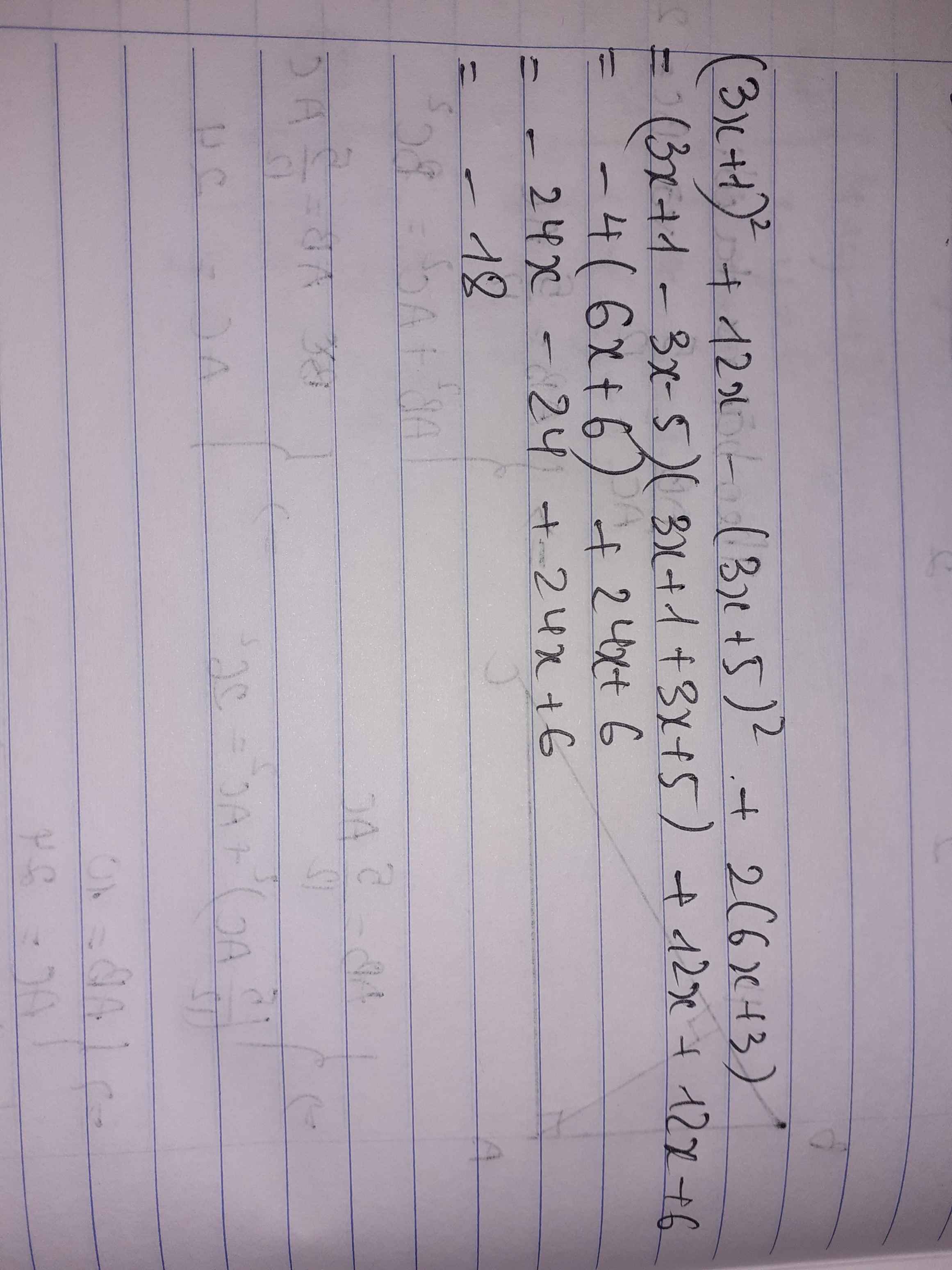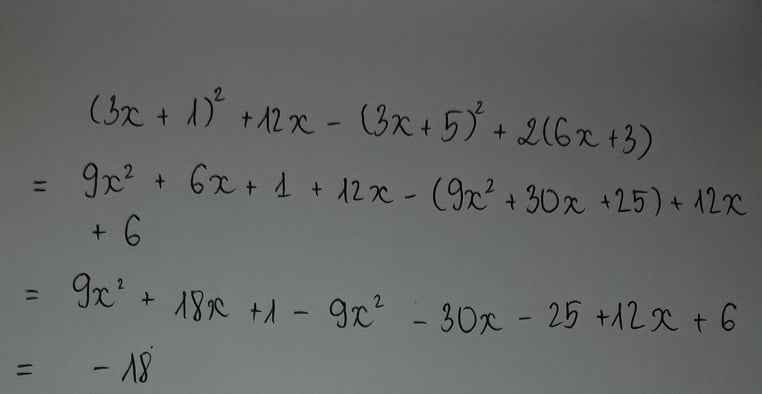(3x+1)^2-12x-(3x+5)^2+2(6x+3)
Hãy nhập câu hỏi của bạn vào đây, nếu là tài khoản VIP, bạn sẽ được ưu tiên trả lời.


a) \(x^2+2x+3=0\)
\(\Rightarrow x^2+2x+3-3=0-3\)
\(\Rightarrow x^2+2x=-3\)
\(\Rightarrow x^2+2x+1=-3+1\)
\(\Rightarrow\left(x+1\right)^2=-2\)
Điều này là vô lý vì bình phương của 1 số luôn lớn hơn hoặc bằng 0 mà -2 < 0.
Vậy đa thức vô nghiệm.


chuyển vế sang r phân tích thành nhân tử, có thể dùng máy tính bỏ túi nhé bạn
câu 1: 9\(x^2\) + 12\(x\) + 5 =11
(3\(x\))2 + 2.3.\(x\) .2 + 22 + 1 = 11
(3\(x\) + 2)2 = 11 - 1
(3\(x\) + 2)2 = 10
\(\left[{}\begin{matrix}3x+2=\sqrt{10}\\3x+2=-\sqrt{10}\end{matrix}\right.\)
\(\left[{}\begin{matrix}3x=\sqrt{10}-2\\3x=-\sqrt{10}-2\end{matrix}\right.\)
\(\left[{}\begin{matrix}x=\dfrac{\sqrt{10}-2}{3}\\x=\dfrac{-\sqrt{10}-2}{3}\end{matrix}\right.\)
Vậy S = {\(\dfrac{-\sqrt{10}-2}{3}\); \(\dfrac{\sqrt{10}-2}{3}\)}
Câu 2: 6\(x^2\) + 16\(x\) + 12 = 2\(x^2\)
6\(x^2\) + 16\(x\) + 12 - 2\(x^2\) = 0
4\(x^2\) + 16\(x\) + 12 = 0
(2\(x\))2 + 2.2.\(x\).4 + 16 - 4 = 0
(2\(x\) + 4)2 = 4
\(\left[{}\begin{matrix}2x+4=2\\2x+4=-2\end{matrix}\right.\)
\(\left[{}\begin{matrix}2x=-2\\2x=-6\end{matrix}\right.\)
\(\left[{}\begin{matrix}x=-1\\x=-3\end{matrix}\right.\)
S = { -3; -1}
3, 16\(x^2\) + 22\(x\) + 11 = 6\(x\) + 5
16\(x^2\) + 22\(x\) - 6\(x\) + 11 - 5 = 0
16\(x^2\) + 16\(x\) + 6 = 0
(4\(x\))2 + 2.4.\(x\) . 2 + 22 + 2 = 0
(4\(x\) + 2)2 + 2 = 0 (1)
Vì (4\(x\)+ 2)2 ≥ 0 ∀ ⇒ (4\(x\) + 2)2 + 2 > 0 ∀ \(x\) vậy (1) Vô nghiệm
S = \(\varnothing\)
Câu 4. 12\(x^2\) + 20\(x\) + 10 = 3\(x^2\) - 4\(x\)
12\(x^2\) + 20\(x\) + 10 - 3\(x^2\) + 4\(x\) = 0
9\(x^2\) + 24\(x\) + 10 = 0
(3\(x\))2 + 2.3.\(x\).4 + 16 - 6 = 0
(3\(x\) + 4)2 = 6
\(\left[{}\begin{matrix}3x+4=\sqrt{6}\\3x+4=-\sqrt{6}\end{matrix}\right.\)
\(\left[{}\begin{matrix}3x=-4+\sqrt{6}\\3x=-4-\sqrt{6}\end{matrix}\right.\)
\(\left[{}\begin{matrix}x=\dfrac{\sqrt{6}-4}{3}\\x=-\dfrac{\sqrt{6}+4}{3}\end{matrix}\right.\)
S = {\(\dfrac{-\sqrt{6}-4}{3}\); \(\dfrac{\sqrt{6}-4}{3}\)}

\(\left(3x+1\right)^2+12x-\left(3x+5\right)^2+2\left(6x+3\right)\)
\(=9x^2+6x+1+12x-9x^2-30x-25+12x+6\)
\(=-18\)
Vậy đa thức trên ko phụ thuộc vào biến

a: ĐKXD: x<>0
\(\dfrac{14x^3+12x^2-14x}{2x}=\left(x+2\right)\left(3x-4\right)\)
=>\(\dfrac{2x\left(7x^2+6x-7\right)}{2x}=\left(x+2\right)\left(3x-4\right)\)
=>\(7x^2+6x-7=3x^2-4x+6x-8\)
=>\(7x^2+6x-7=3x^2+2x-8\)
=>\(4x^2+4x+1=0\)
=>\(\left(2x+1\right)^2=0\)
=>2x+1=0
=>x=-1/2(nhận)
b: \(\left(4x-5\right)\left(6x+1\right)-\left(8x+3\right)\left(3x-4\right)=15\)
=>\(24x^2+4x-30x-5-\left(24x^2-32x+9x-12\right)=15\)
=>\(24x^2-26x-5-24x^2+23x+12=15\)
=>-3x+7=15
=>-3x=8
=>\(x=-\dfrac{8}{3}\)

A = ( 3x + 1 ) 2 + 12x - ( 3x + 5 ) 2+ 2( 6x + 3 )
=9x2+6x+1+12x-9x2-30x-25+12x+6
=(9x2-9x2)+(6x+12x-30x+12x)+1-25+6
=0+0+(-18)
=-18
A=(3x+1)2+12x-(3x+5)2+2(6x+3)
=9x2+6x+1+12x-(9x2+30x+25)+12x+6
=9x2+6x+1+12x-9x2-30x-25+12x+6
=60x-18
\(\Rightarrow\)đề sai 100%



cm bieu thuc k phu thuoc vao bien x